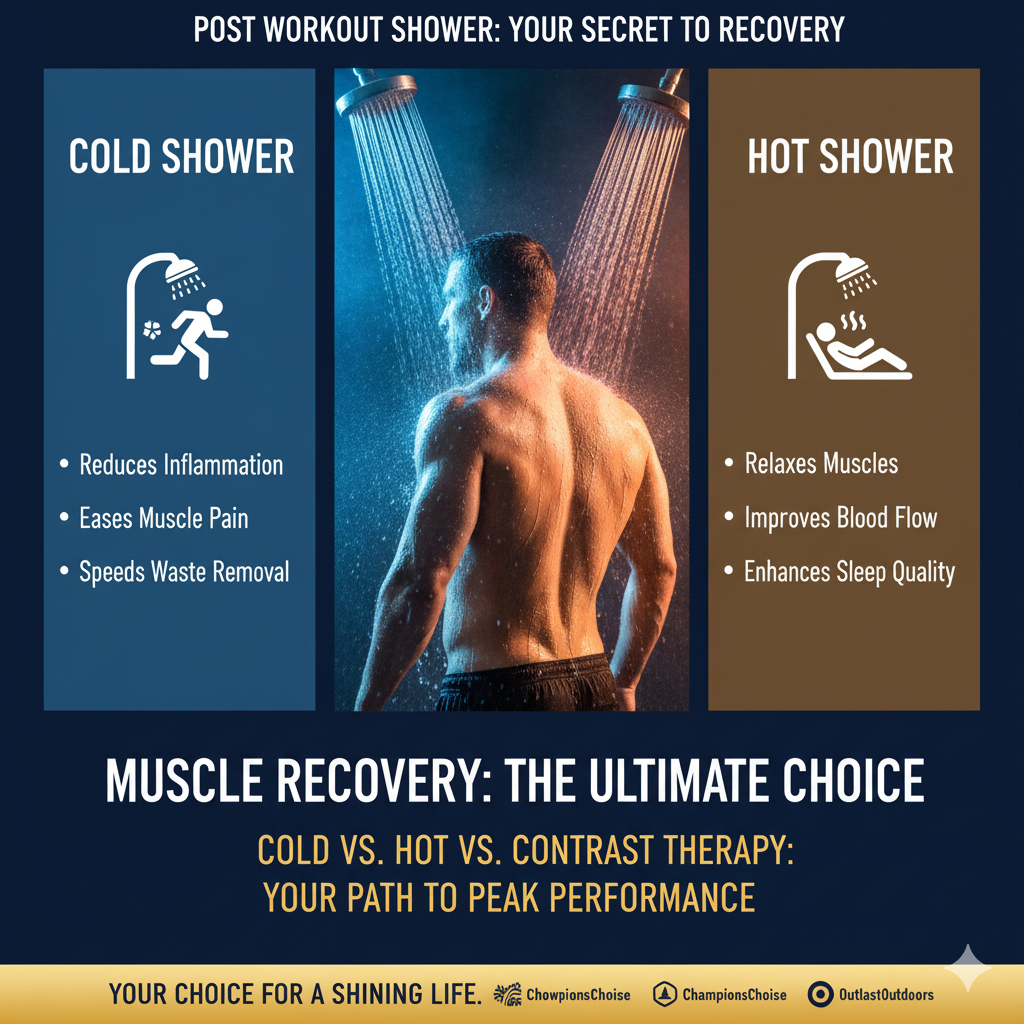
Post-Workout: Cold Shower vs. Hot Shower – Which is the Better Choice for Muscle Recovery?
Share
As a fitness enthusiast, you know that the journey to achieving your goals doesn't end when you step out of the gym. In fact, the real work begins after your workout, when your body is in desperate need of recovery and rejuvenation. One of the most debated topics in the fitness community is the age-old question: should you opt for a cold shower or a hot shower after a grueling workout?
Both cold and hot showers have their own unique benefits when it comes to post-workout recovery, and the choice ultimately comes down to your personal preferences and fitness goals. In this blog post, we'll dive deep into the pros and cons of each option, so you can make an informed decision and maximize your muscle recovery.
The Benefits of a Cold Shower
When it comes to post-workout recovery, a cold shower can be a game-changer. Here's why:
1. Reduces Muscle Inflammation
One of the primary benefits of a cold shower is its ability to reduce muscle inflammation. During exercise, your muscles undergo microscopic tears, which can lead to inflammation and soreness. By exposing your body to cold water, you can constrict blood vessels and reduce the flow of blood to the affected areas, effectively minimizing inflammation and speeding up the recovery process.
2. Speeds Up Recovery
Cold water therapy, also known as cryotherapy, has been shown to accelerate the recovery process by flushing out lactic acid and other metabolic waste products that accumulate in your muscles during exercise. This can help alleviate muscle soreness and stiffness, allowing you to bounce back faster and get back to your training routine.
3. Enhances Blood Circulation
The sudden exposure to cold water can also stimulate your body's natural response to improve blood circulation. This increased blood flow helps deliver more oxygen and nutrients to your muscles, aiding in the repair and regeneration process.
4. Potential Pain Reduction
Some studies suggest that cold showers may have a numbing effect on the nervous system, which can help reduce the perception of pain and discomfort associated with post-workout muscle soreness. This can be particularly beneficial for individuals who engage in high-intensity or endurance-based activities.
The Benefits of a Hot Shower
While a cold shower may be the go-to choice for many fitness enthusiasts, a hot shower also has its own set of advantages when it comes to post-workout recovery:
1. Muscle Relaxation
The warm water of a hot shower can help relax and soothe your muscles, reducing tension and stiffness. This can be especially beneficial for individuals who engage in strength training or other activities that put a significant amount of stress on their muscles.
2. Improved Flexibility
The heat from a hot shower can also help increase blood flow and improve flexibility, which can be crucial for maintaining proper form and range of motion during your workouts.
3. Mental Stress Relief
In addition to the physical benefits, a hot shower can also provide a much-needed mental break and stress relief after a challenging workout. The warm water and steam can help calm the mind, reduce anxiety, and promote a sense of relaxation.
4. Increased Blood Flow
Similar to the effects of a cold shower, the heat from a hot shower can also stimulate increased blood flow, delivering more oxygen and nutrients to your muscles and aiding in the recovery process.
The Scientific Perspective
From a scientific standpoint, both cold and hot water therapy have been extensively studied for their effects on post-workout recovery. While the research findings are not entirely conclusive, there are some general trends that can guide your decision-making.
Studies have shown that cold water immersion can be effective in reducing muscle soreness and inflammation, as well as improving recovery time. The cold temperature triggers a physiological response that constricts blood vessels, reduces blood flow, and decreases the metabolic activity in the affected muscles.
On the other hand, hot water therapy has been found to have a positive impact on muscle relaxation, flexibility, and overall blood circulation. The heat helps dilate blood vessels, increase blood flow, and promote the delivery of essential nutrients to the muscles.
Ultimately, the choice between a cold shower and a hot shower may depend on your individual fitness goals, the intensity of your workout, and your personal preferences. Some experts recommend alternating between the two, as the combination of hot and cold can provide a more comprehensive approach to post-workout recovery.
Choosing the Right Shower
When it comes to choosing the right post-workout shower, there are a few factors to consider:
1. Fitness Goals
If your primary goal is to reduce muscle inflammation and speed up recovery, a cold shower may be the better choice. However, if you're more focused on muscle relaxation and flexibility, a hot shower might be the way to go.
2. Workout Intensity
The intensity of your workout can also play a role in your shower preference. For high-intensity or endurance-based activities, a cold shower may be more beneficial in reducing inflammation and promoting faster recovery. For lower-intensity workouts, a hot shower may be more suitable for relaxation and stress relief.
3. Personal Comfort
At the end of the day, the most important factor is your personal comfort and preference. Some individuals may find cold showers invigorating, while others may prefer the soothing warmth of a hot shower. Experiment with both and see what works best for you.
Practical Tips
Here are some practical tips to help you make the most of your post-workout shower, whether it's cold or hot:
1. Shower Duration
Aim for a shower duration of 5-10 minutes, as prolonged exposure to extreme temperatures can be counterproductive.
2. Temperature Guidelines
For a cold shower, aim for water temperatures between 50-60°F (10-15°C). For a hot shower, keep the temperature between 100-105°F (37-41°C).
3. Alternating Approach
Consider alternating between cold and hot water during your shower, starting with a cold rinse, followed by a hot phase, and then ending with a final cold blast.
4. Post-Shower Recovery
Complement your post-workout shower with other recovery techniques, such as foam rolling, stretching, or light active recovery activities to further enhance muscle recovery and reduce soreness.
Conclusion
When it comes to post-workout recovery, the choice between a cold shower and a hot shower is a personal one, and there's no one-size-fits-all solution. By understanding the benefits of each approach and considering your individual fitness goals and preferences, you can make an informed decision and optimize your post-workout routine for maximum muscle recovery and overall well-being.
Remember, the key is to experiment and find what works best for you. Don't be afraid to try different approaches and adjust your post-workout routine until you find the perfect balance that helps you feel refreshed, rejuvenated, and ready to tackle your next workout with renewed energy and enthusiasm.
Related Keywords : Post-workout shower, Muscle recovery, Workout tips, Cold water immersion, Cold shower, Hot shower, Workout motivation
Family Sites : Bark&MeowCorner, CozyCat, BarkBoulevard, MiniMiracles, PetalPals, OfficeOrbit, MediLove, LuxeBloom, BeautySecrets, SerenityBeauty, FresFaceBoutique, PowerHouse, ChampionsChoice, OutlastOutdoors
